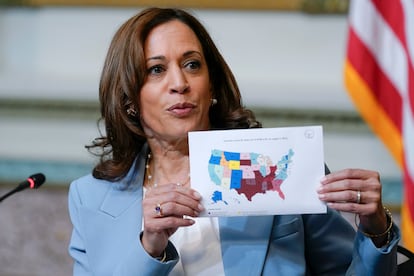Education, religion and ethnicity: What do Republican and Democratic voters look like in 2024?
In recent years, the hostility felt by supporters of one party toward the other has grown, demonstrating a greater divide in the United States ahead of the upcoming elections

The political landscape in the United States is increasingly polarized, with wide differences between Democratic and Republican voters in terms of demographics, beliefs and motivations. As the country prepares for Election Day, understanding these differences is crucial to understanding the issues that matter most to Americans.
Recent surveys and research reveal more about these contrasts, and show not only how supporters of each party differ, but also how they perceive and often misunderstand each other’s motivations. Here’s what to know:
Democrats
Demographics and education
Democratic voters are increasingly diverse in terms of race and ethnicity. According to the Pew Research Center, more than 40% of Democratic voters identify themselves as Hispanic, Black, Asian or other race, up from 23% in 1996, which is a significant change from the more homogeneous composition in the past. In addition, the educational attainment of Democratic voters has increased significantly: 45% of Democratic voters have at least a bachelor’s degree, up from 22% in 1996. This contrasts with the more slight increase in educational attainment among Republicans, where only 35% have a four-year degree.
Religion
Democratic voters are also more likely to be unaffiliated with any religion compared to Republicans. According to data from the Pew Research Center, half of Democratic voters identify as non-Christian or religiously unaffiliated, with 38% having no religious affiliation at all in 2024. This is a change from a time when Christians made up the overwhelming majority of Democratic voters.
Policy preferences and motivations
Democratic voters tend to prioritize issues such as gun violence, healthcare costs and climate change. According to the Pew Research Center survey, 68% of Democrats consider gun violence a very serious problem, while healthcare costs and partisan gridlock are also major concerns.
On abortion, Democrats overwhelmingly support legal access, with 85% saying abortion should be legal in all or most cases, according to the same polls. This support has increased over the past decade. Also, Democrats are more likely to have an unfavorable view of the Supreme Court, especially in the wake of the overturning of Roe v. Wade, with only 24% expressing a favorable view of the court.

Self-descriptions and ideological differences
Democratic voters describe themselves as more open-minded (75%) than Republicans (54%), according to a survey by researchers Shanay Gracia and Andrew Daniller. Members of that party also think of themselves as being respectful of authority (61%), but less so than Republicans (71%). Democrats consider themselves more interested in visiting other countries and are more supportive of LGBTQ rights.
How do they perceive Republicans?
According to a report by Eric Plutzer and Michael Berkman, Democrats feel somewhat more empathy toward Republicans than vice versa. While many Democrats perceive Republicans as uninformed or self-interested, they also recognize that some Republican voters may be motivated by genuine policy concerns, such as tax cuts and immigration.

Republicans
Demographics and education
According to the Pew Research Center survey, Republican voters are predominantly white, although this demographic is diversifying slightly over time. In 2024, 79% of Republican voters will be non-Hispanic white, down from 93% nearly two decades ago. In addition, about two-thirds of Republican voters do not have a four-year college degree, a higher percentage than the general voting population. The largest bloc within the party is made up of white adults without a college degree, who represent 51% of Republican voters.
Religion
Another Pew Center survey found that a significant share of Republican voters identify with as Christian (81%). Among them, white evangelical Protestants account for 30% of registered GOP voters, a higher proportion compared to the general U.S. population (17%). Only 15% of Republican voters don’t have any religious affiliation.
Political preferences and motivations
Similarly, Pew polls reveal that Republican voters express strong concerns about illegal immigration and inflation. One poll shows that 78% of Republicans consider illegal immigration a very serious problem, significantly higher than the 51% of all U.S. adults who share this view, while 80% of Republicans consider inflation a major problem. On abortion, 57% of Republicans believe it should be illegal in all or most cases.
Republicans mostly support Donald Trump, with 84% indicating they would vote for him if the election were held today. Despite this, many Republicans have reservations about his personal conduct, with only 26% expressing a favorable opinion of his behavior.
What do they think of the Democrats?
According to the Plutzer and Berkman study, Republicans have a hard time understanding the motivations of Democratic voters. Many Republicans believe that Democrats are misled by the media or motivated by self-interest. They often attribute Democratic voting behavior to desires for “free stuff” or other benefits, rather than genuine concern for the country. In contrast, Democrats find it somewhat easier to empathize with Republican motivations, often attributing them to policy preferences and ideological beliefs.
Self-descriptions and ideological differences
The same research (published by Pennsylvania State University) found that Republican voters are more likely to describe themselves as traditional (58%) and skeptical of experts (44%). In contrast, fewer Democrats (19% and 17%, respectively) share these self-descriptions. Republicans also consider themselves more respectful of authority (71%) than Democrats (61%).
Tu suscripción se está usando en otro dispositivo
¿Quieres añadir otro usuario a tu suscripción?
Si continúas leyendo en este dispositivo, no se podrá leer en el otro.
FlechaTu suscripción se está usando en otro dispositivo y solo puedes acceder a EL PAÍS desde un dispositivo a la vez.
Si quieres compartir tu cuenta, cambia tu suscripción a la modalidad Premium, así podrás añadir otro usuario. Cada uno accederá con su propia cuenta de email, lo que os permitirá personalizar vuestra experiencia en EL PAÍS.
¿Tienes una suscripción de empresa? Accede aquí para contratar más cuentas.
En el caso de no saber quién está usando tu cuenta, te recomendamos cambiar tu contraseña aquí.
Si decides continuar compartiendo tu cuenta, este mensaje se mostrará en tu dispositivo y en el de la otra persona que está usando tu cuenta de forma indefinida, afectando a tu experiencia de lectura. Puedes consultar aquí los términos y condiciones de la suscripción digital.









































